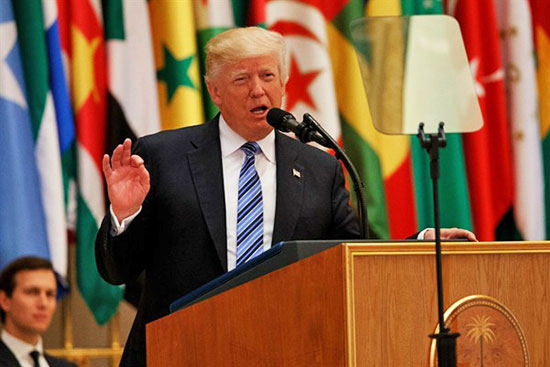|
from
WorldPoliticsReview Website
delivers a speech to the Arab Islamic American Summit, at the King Abdulaziz Conference Center, Riyadh, Saudi Arabia, May 21, 2017 (AP photo by Evan Vucci).
Has Donald Trump lost faith in realpolitik?
On the campaign
trail, the U.S. president promised to adopt a hard-nosed approach to
promoting America's interests. He ostentatiously spurned the stock
talking points about his country's values and global mission that
most presidential candidates tend to trot out.
The president told one interviewer that the U.S. is not morally superior to Russia. Secretary of State Rex Tillerson has warned diplomats that an excessive emphasis on advancing American values,
Yet the administration has not been able to resist the appeal of highly moralistic rhetoric.
In Riyadh this weekend, Trump gave a speech on Islamist extremism suffused with religious language.
He framed the battle against groups like al-Qaida and the so-called Islamic State as war between good and evil, and threatened terrorists with damnation.
The capital letters are in the official
version of the speech...
But the president's rhetoric has taken on a stern moral edge more generally.
He justified his missile strikes in response to the Syrian regime's use of chemical weapons in April by arguing that,
It is difficult to say whether Trump uses this type of phrase out of deep conviction, or simply because it is the sort of thing that he thinks sounds presidential.
Nonetheless, other members of the
administration certainly seem to see advantage in framing America's
response to foreign crises in starkly moralistic terms.
In contrast to Tillerson's reservations about promoting values, Haley has also underlined U.S. commitments to human rights.
This may partially be gamesmanship:
It is easy to be cynical about all this moral talk.
The Trump administration is profoundly entangled in accusations of personal and political improprieties. It is not surprising that it should try to prove that it is virtuous by claiming the ethical high road in international affairs.
If you judge the president on some of his
policies, such as plans to
slash foreign aid to needy states, it is hard to take all his
rhetoric seriously.
Trump has less room fordiplomatic maneuver and is more likelyto dress up dangerous foreign actionsin ethical and even religious terms.
Indeed, it is arguable that the president is exploiting moral language to cover up some morally questionable policies.
While he may frame the struggle with Islamist extremism in terms of good and evil, this is basically an excuse for ratcheting up military operations against al-Qaida and the Islamic State, while simultaneously boosting arms sales to Saudi Arabia and other allies in the Middle East.
This is liable to raise
tensions between the Saudis and Iran, worsening violence and fueling
extremists in Syria and Yemen. Strip away the stuff about souls, and
U.S. policy in the region still rests on nasty realpolitik.
It is reported that, during his infamous meeting with Russian Foreign minister Sergei Lavrov at the White House earlier this month, the president suggested he has little personal interest in Ukraine but that,
Lavrov and other international veterans probably do not take Trump's recent moral rhetoric very seriously. Yet this rhetoric does matter.
When Trump came into office, few analysts believed he could have a positive impact on international affairs. But his unemotional and transactional attitude did seem to have a few potential advantages.
An ostentatiously amoral leader like Trump might just be able to cut deals with Russia over problems like Syria and Ukraine that more traditional U.S. politicians could not, for example.
And while Trump's "America First" rhetoric was
always unpleasant, it at least implied that he was not going to
pursue foreign adventures comparable to the
George W. Bush
administration's invasion of Iraq.
And the more he and
his advisers condemn Syria and Russia in moral terms, the harder it
will be to engineer necessary compromises in future.
He has less room for diplomatic maneuver and is more likely to dress up dangerous foreign actions in ethical and even religious terms.
An erratic leader with
no morals is a dangerous thing. But an erratic leader who bets that
he can dress up bad policies in moral terms may be even worse...
|


